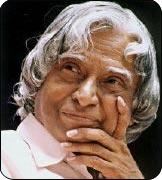

Avul Pakir Jainulabdeen Abdul Kalam , born October 15, 1931, Tamil Nadu, India, usually referred to as Dr. A.P.J. Abdul Kalam is the current President of India. A notable scientist and an engineer, he is often referred to as the Missile Man of India.
In office since:July 25, 2002
Vice President(s) :Bhairon Singh Shekhawat
Preceded by:K. R. Narayanan
Succeeded by:Incumbent
Political party:Independent
Spouse:Celibate
Religion:Islam
Career
Abdul Kalam was born on 15th October 1931 at Rameswaram in Dhanushkodi, Tamil Nadu, to a working class Tamil Muslim family. He received his degree in aeronautical engineering from the Madras Institute of Technology in 1958. He joined India's Defence Research and Development Organisation (DRDO) upon graduation to work on a hovercraft project. In 1962, Kalam moved to the Indian Space Research Organisation (ISRO), where his team successfully launched several satellites. He made a significant contribution as Project Director to develop India's first indigenous Satellite Launch Vehicle (SLV-III) which successfully placed the Rohini satellite into near earth orbit in July 1980.
In 1982, Kalam returned to the DRDO as Director, focusing on Indigenous guided missiles. He was responsible for the development and operationalisation of the AGNI and PRITHVI missiles. This earned him the sobriquet "India's missile-man". He also helped in the formulation of healthcare products using technology developed for missiles.
In July 1992, Kalam became a Scientific Advisor to India's Defence Minister. As the Principal Scientific Advisor to the Indian government, he held the rank of a Cabinet Minister. His work led to the successful Pokhran-II nuclear tests in 1998, which reiterated India's position as a nuclear weapon state. Kalam was also the Chairman, Ex-officio, of the Scientific Advisory Committee to the Cabinet (SAC-C) and piloted the "India Millennium Mission 2020".
Kalam later took up academia as a Professor of Technology & Societal Transformation at Anna University, Chennai from November 2001 and was involved in teaching and research tasks. Above all, he took up a mission to ignite the young minds for national development by meeting young school students across the country.
Kalam was elected the 11th President of India and took office on July 25, 2002.
Honours
Kalam has the unique distinction of having received honorary doctorates from at least thirty universities, as also India's three highest civilian honours: the Padma Bhushan in 1981; the Padma Vibhushan in 1990; and the Bharat Ratna in 1997. He has recently refused an honorary doctorate from a University, stating he is satisfied with the ones he has earned with his hard work and determination.
Political views
Something of Kalam's probable views on certain issues can be surmised from positions espoused by him in the past. His book "India 2020" strongly advocates an action plan to develop India into a knowledge superpower and into a developed nation by the year 2020. Kalam is credited with the view that India ought to take a more assertive stance in international relations; he apparently regards his work on India's nuclear weapons program as a way to assert India's place as a future superpower.
Kalam continues to take an active interest in other developments in the field of science and technology as well. He has proposed a research programme for developing bio-implants. He is a supporter of Open source software over proprietary solutions and believes that the use of open source software on a large scale will bring more people the benefits of information technology
Personal life
Kalam observes strict personal discipline, practicing vegetarianism, teetotalism and celibacy. Kalam is a scholar of Tirukkural; in most of his speeches, he quotes at least one kural. He reads the Qur'an (the main holy text of his faith, Islam) regularly. He is believed to recite the Bhagvad Gita daily.Kalam has written several inspirational books, most notably his autobiography Wings of Fire, aimed at motivating Indian youth. Another of his books, Guiding Souls: Dialogues on the Purpose of Life reveals his spiritual side. It has been reported that there is considerable demand in South Korea for translated versions of books authored by him
Trivia
He loves children, and encourages their audiences with him.
On Tuesday, 14 February, 2006, he created history by becoming the country's first President to undertake an undersea journey. Abdul Kalam boarded the INS Sindhurakshak, a Russian-origin kilo class submarine, from the Visakhapatnam Naval dockyard. The duration of the journey was around three-and-half hours during which Kalam had lunch with the crewmembers.
He did his college studies at the Madras Institute of Technology, where he used to head the vegetarian mess.
Initially he wanted to become a pilot, but was rejected and then opted for aeronautical engineering later.
On Thursday, 08 June, 2006, he created history by becoming the country's first president to undertake a sortie in an aircraft, the Sukhoi-30 MKI, the latest supersonic fighter aircraft, from Lohegaon (Pune) airbase. As a 74-year old, he created a record by becoming the oldest Indian co-pilot to do so. The president donned a G Suit before boarding the aircraft, and was also given instructions by Air Force officials. He was strapped in by Corporal H L Ganesh. He flew at a height of six to eight kilometers in the air at a speed of 1500Km/Hr. The flight lasted 30 minutes. Wing Commander Ajay Rathore, Commanding Officer of the SU-30 MKI squadron flew the President.
His popularity among Indian youth can be gauged from the fact that his request to re election as president petition in Petition Online site is the one of the Top 10 petitions for the past several days.
As a sign of his popularity among Indian youth, MTV-India recently nominated him as one of the prospectives for its MTV India Youth Icon for the year 2006 Award
If you want more information on Dr.Kalam visit the links below:
http://presidentofindia.nic.in/scripts/presidentprofile.jsp
http://www.abdulkalam.com/
http://www.geocities.com/siafdu/kalam.html
No comments:
Post a Comment